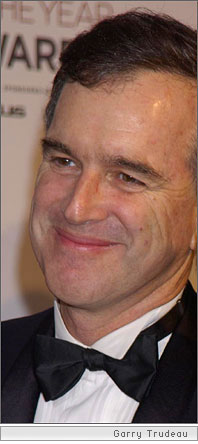After commenting on almost every political and cultural controversy of the past three decades — from Vietnam to Iraq, from revolutions sexual to Starbucksian — Garry Trudeau is at it again. This Sunday, “Doonesbury,” his popular and beloved comic strip, might be pulled from roughly half of the 700 newspapers that syndicate it.
Why the uproar? Because Trudeau has dared to address the ever-sensitive issue of getting off — specifically, how getting off can keep you healthy. The strip is based on a recent study in the New Scientist that finds that frequent masturbation can help prevent prostate cancer. Despite the subject matter’s rather heartwarming implications, 19 out of 34 editors polled by the Milwaukee Journal said they would not publish it.
Trudeau talked with Salon by e-mail, about the masturbation furor, “Doonesbury’s” history of controversy, and which of his characters would be most likely to take the study about prostate cancer to, er, heart.
So it looks like you’re the new Joycelyn Elders. What do you think it is about the M-word that has provoked such a strong response?
Well, there are certain words that trigger a response simply because they’ve never before appeared in a family-friendly context like the comics. “Masturbation” is obviously a loaded word, but as a descriptor, it’s not actually vulgar or coarse, which is why I’m comfortable using it. And the strip in question isn’t actually about masturbation or cancer, it’s about the inability of two particular adults to find a mutual comfort zone to discuss a serious subject. Since the more traditional viewpoint (Boopsie’s) is presented without mockery, conservative readers really shouldn’t be offended.
Still, the syndicate and I understood that some papers would not be prepared to accommodate this little depiction of the shifting nature of taboos. After all, editors are still arguing over the acceptability of the word “suck.” So we offered a substitute strip for editors who themselves felt caught out of their comfort zones by the strip.
Do you feel as if the climate for publishing controversial strips has changed since you first began publishing “Doonesbury”?
Absolutely. It’s much more friendly. In the early years, I was constantly preoccupied with blowback. “Doonesbury”-related controversies used to flare up at least once a month. One year there were 12 wire service stories about dropped strips. It was a constant struggle keeping everyone onboard.
But then two things changed: First, editors got used to me and began to understand that I did not wake up in the morning trying to figure out how to piss them off, but was actually writing about serious issues in a reasonably responsible way, considering it’s satire. Second, the world changed: The bar got lowered with raunch radio, “South Park,” and “Tonight Show” jokes about fellatio. Against that backdrop, “Doonesbury” no longer seemed quite so shocking. Which after 33 years is fine with me. It was exhausting to always be in a defensive crouch.
What do you personally consider to be the biggest risk you ever took with a “Doonesbury” strip?
Well, I never thought of myself as being at risk, which is probably why I got away with so much. I simply followed my interests and concerns, and trusted my editor to tell me when he thought I’d gone too far. Part of the secret to slipping tough material into a comic strip is pacing. Jim Andrews, my editor in the early days, once said to me, “You can write about bombing in Cambodia this week, but you damn well better write about football next week.” If you’re in it for the long haul, you have to know when to remove your knee from the reader’s windpipe. Aaron Magruder’s [“Boondocks” creator] still working on that one.
Which scandals, in hindsight, seem the most ludicrous?
In hindsight, of course, they all seem ludicrous, but my favorite was a series I did linking then-Gov. Jerry Brown to Sidney Korshak, who was on the FBI’s list of top mob figures. The strip was bounced from papers all over California, condemning it as unfair. In a nice touch, the only other newspapers in the country who shared their outrage were in Las Vegas and Reno.
Of all the characters in “Doonesbury,” who would be the most likely to “censor” a comic strip, and why?
You have to be careful here. Technically, the exclusion of my strip from a newspaper is not censorship. It’s called editing. Newspaper editors have a right and responsibility to control the content of their papers. They’re public stewards and have to make dozens of calls every day on what meets the standards of their particular community. I don’t always admire the rationale for dropping a strip (see California story above), but I see no reason why I should expect to be in every one of 700 papers every day. The miracle is that I have appeared as often as I have.
Having said that, the answer is Duke, whose fundamental belief in the efficacy of authoritarianism makes censorship a no-brainer.
And finally, which character do you think would be the one who would most actively launch a preventive strike against prostate cancer?
The college boys, Jeff and Zipper, although I’m sure all the characters take sensible prophylactic measures.

